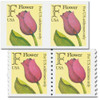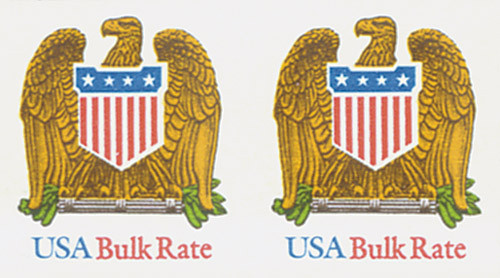
# 2518//18a - 1991 29c F-Rate Flower, imperf pair with free normal pair
US #2518//18a
1991 Flower
- Imperforate Pair with normal stamp
- Rate Change Stamp
- Printed by three different companies
- Produced in three formats
Category of Stamp: Definitive
Value: 29¢, First-Class mail rate
First Day of Issue: January 22, 1991
First Day City: Washington, DC
Quantity Issued: Unknown
Printed by: Bureau of Engraving and Printing
Printing Method/Format: Photogravure. Coils of 100 (from printing cylinders of 480), 500, and 3,000 (both from printing cylinders of 432)
Perforations: 10
Reason the stamp was issued: The Flower stamp was issued as a result of a rate change for First Class letters from 25¢ to 29¢. The rate change stamp was issued to meet demand until stamps with the new rate were produced.
About the stamp design: Beginning in 1978, rate change stamps were marked by a letter of the alphabet. This stamp was the sixth in this progression, so it bears the letter “F.” It pictures a red tulip with a single green leaf. The design is the work of Wallace Marosek, who produced the artwork for a project when he was a student at Yale University School of Art and Architecture.
About the printing process: In addition to the coil stamps, the Bureau of Engraving and Printing also produced booklets. Sheet stamps were printed by United States Bank Note Corporation. KCS Industries Inc. also printed booklets l. The veins on the leaf are darker on the BEP stamps.
First Day City: There was no official First Day of Issue ceremony for the “F” stamp.
Unusual thing about this stamp: This error stamp was produced during the perforation stage of printing. Because the process for printing coil stamps is mostly automated, these imperforate stamps sometimes slip past Postal Service inspectors. Along with the imperforate pair, you’ll also receive a normal stamp for FREE.
History the stamp represents: Since 1978, the USPS has accompanied a change in rate with a non-denominated stamp on which a letter of the alphabet represents the new denomination. Prepared long in advance, the “F” stamp was ready and waiting for the 1991 rate change. Like the 1988 “E” stamp, the subject of this stamp, a single red tulip, was chosen to match the letter “F.”
US #2518//18a
1991 Flower
- Imperforate Pair with normal stamp
- Rate Change Stamp
- Printed by three different companies
- Produced in three formats
Category of Stamp: Definitive
Value: 29¢, First-Class mail rate
First Day of Issue: January 22, 1991
First Day City: Washington, DC
Quantity Issued: Unknown
Printed by: Bureau of Engraving and Printing
Printing Method/Format: Photogravure. Coils of 100 (from printing cylinders of 480), 500, and 3,000 (both from printing cylinders of 432)
Perforations: 10
Reason the stamp was issued: The Flower stamp was issued as a result of a rate change for First Class letters from 25¢ to 29¢. The rate change stamp was issued to meet demand until stamps with the new rate were produced.
About the stamp design: Beginning in 1978, rate change stamps were marked by a letter of the alphabet. This stamp was the sixth in this progression, so it bears the letter “F.” It pictures a red tulip with a single green leaf. The design is the work of Wallace Marosek, who produced the artwork for a project when he was a student at Yale University School of Art and Architecture.
About the printing process: In addition to the coil stamps, the Bureau of Engraving and Printing also produced booklets. Sheet stamps were printed by United States Bank Note Corporation. KCS Industries Inc. also printed booklets l. The veins on the leaf are darker on the BEP stamps.
First Day City: There was no official First Day of Issue ceremony for the “F” stamp.
Unusual thing about this stamp: This error stamp was produced during the perforation stage of printing. Because the process for printing coil stamps is mostly automated, these imperforate stamps sometimes slip past Postal Service inspectors. Along with the imperforate pair, you’ll also receive a normal stamp for FREE.
History the stamp represents: Since 1978, the USPS has accompanied a change in rate with a non-denominated stamp on which a letter of the alphabet represents the new denomination. Prepared long in advance, the “F” stamp was ready and waiting for the 1991 rate change. Like the 1988 “E” stamp, the subject of this stamp, a single red tulip, was chosen to match the letter “F.”











